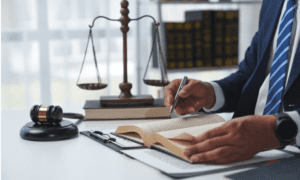Welcome to our blog post, where we delve into the fascinating world of law and its indispensable functions. From safeguarding our fundamental rights to upholding justice and fostering fairness in society, the essential functions of law form the backbone of every thriving civilization. Join us as we explore how these crucial aspects shape our lives, ensuring harmonious coexistence and a just society for all. Whether you’re an aspiring lawyer or simply curious about the inner workings of legal systems, this article will provide valuable insights that are bound to captivate your attention from start to finish!
Introduction
The law is a fundamental aspect of our society, playing a crucial role in shaping how we live and interact with one another. It provides a framework for maintaining order, resolving conflicts, protecting individual rights, and upholding justice. The concept of law can be traced back to ancient civilizations such as Mesopotamia, Egypt, and Greece, where it was established as a means of regulating social behavior.
The foundation of the law lies in the idea that all individuals are equal before it and must abide by its rules. It serves as a set of guidelines that govern human conduct to ensure fairness and equality for all members of society. The laws created by governments aim to protect the rights and freedoms of citizens while promoting peace and harmony within communities.
One of the primary functions of the law is to protect individual rights. These include basic human rights such as freedom of speech, religion, assembly, and privacy. Laws also safeguard property ownership rights, ensuring that individuals are not wrongfully deprived of or exploited by others. Without these legal protections in place, there would be chaos and anarchy in society.
The primary functions of law
The primary functions of the law play a crucial role in maintaining order and promoting a fair and just society. These functions include protecting individual rights, maintaining justice, and ensuring fairness for all members of society.
One of the fundamental purposes of the law is to protect the rights of individuals. This includes protecting their right to life, liberty, and property. Laws establish guidelines for behavior that must be followed by all citizens, including those in positions of power. By upholding individual rights, the law helps prevent discrimination and abuse of power. It also provides a mechanism for individuals to seek justice if their rights have been violated.
In addition to protecting rights, another essential function of the law is to maintain justice within society. The legal system provides a framework for resolving disputes between individuals or groups in a fair and impartial manner. It ensures that those who commit crimes are held accountable for their actions while also providing due process protections for the accused. Without laws in place to guide the administration of justice, there would be chaos and anarchy in society.
1. Protecting Rights:
One of the essential functions of the law is to protect the rights and freedoms of individuals. In a society, individuals are granted certain rights and freedoms that must be safeguarded in order to maintain justice and ensure fairness for all.
Individual rights refer to the basic liberties and protections that every person is entitled to, such as freedom of speech, religion, assembly, and due process. These rights are crucial for individuals to lead a life free from oppression or discrimination. However, without laws in place to protect these rights, they can easily be violated by those in positions of power.
Laws play a critical role in safeguarding individual rights by setting clear boundaries and consequences for those who violate them. For instance, laws against hate speech protect an individual’s right to freely express their beliefs without fear of discrimination or harm. Similarly, laws against discrimination based on race, gender, or sexual orientation protect an individual’s right to equal treatment under the law.
2. Maintaining Justice
The primary function of law is to establish and maintain justice within a society. This means that it serves to ensure that individuals are held accountable for their actions and that those who have been wronged can seek redress. Maintaining justice is a crucial aspect of the legal system, as it plays a vital role in promoting fairness and order in society.
One of the key ways in which the law maintains justice is by establishing consequences for criminal behavior. Criminal behavior refers to any action or omission that violates the laws of a particular jurisdiction. These behaviors can range from minor offenses such as traffic violations to more serious crimes like murder or theft.
The law establishes consequences for criminal behavior through the criminal justice system, which includes police, courts, and corrections institutions. When an individual commits a crime, they are arrested by the police and charged with an offense. The case then moves through the court system, where evidence is presented and a judgment is made based on whether the accused is found guilty or not guilty.
If found guilty, the defendant will face consequences determined by the law. These consequences may include fines, imprisonment, probation, community service, or other forms of punishment deemed appropriate for the specific offense committed. The severity of these consequences often depends on factors such as the nature of the crime, the previous criminal history of the offender, and mitigating circumstances.
3. Ensuring Fairness:
One of the primary functions of the law is to ensure fairness in society. This means creating a level playing field for all individuals, regardless of their race, gender, religion, or socioeconomic status. Laws play a crucial role in promoting equality and preventing discrimination by setting standards and guidelines that govern how people should be treated in different situations.
Equal Treatment under the Law
The concept of equal treatment under the law is a fundamental principle of justice. It means that every individual should be treated equally before the law, regardless of their background or personal characteristics. This principle ensures that no one receives special treatment or faces discrimination based on factors such as race, gender, religion, sexual orientation, or disability.
Laws promote equal treatment by prohibiting discriminatory practices and behaviors. For example, laws against racial discrimination in employment ensure that individuals are not denied job opportunities based on their race. Similarly, laws against gender-based discrimination protect women from being paid less than men for doing the same job.
Protection against Discrimination
Discrimination occurs when someone is treated unfairly because of their membership in a particular group or category. It can take many forms, from overt acts such as hate crimes to subtle biases in decision-making processes.
Laws play a crucial role in protecting individuals from discrimination by outlining what constitutes discriminatory behavior and providing mechanisms for addressing it. For example, the Civil Rights Act of 1964 prohibits employment discrimination based on race, color, religion, sex, or national origin.
Promoting Equality
Equality means that everyone has the same rights, opportunities, and treatment under the law. Laws promote equality by ensuring that all individuals have access to basic human rights such as education, healthcare, and a fair justice system.
Examples of laws that serve each function
There are countless laws in place that serve the essential functions of protecting rights, maintaining justice, and ensuring fairness. These laws cover a wide range of issues and situations, all with the purpose of preserving order and promoting equality within society.
One example of a law that protects rights is the Civil Rights Act of 1964 in the United States. This law prohibits discrimination on the basis of race, color, religion, sex, or national origin in any public facility or federally funded program. It also guarantees equal employment opportunities for all individuals, regardless of their race or gender. By protecting these fundamental rights, this law ensures that everyone has an equal chance to succeed and be treated fairly.
Another important function of law is maintaining justice, which can be seen through criminal laws such as murder statutes. These laws define what constitutes a crime and outline the penalties for those who break them. They also establish procedures for conducting trials and determining guilt or innocence. Without these laws in place, there would be chaos, and individuals would take matters into their own hands when seeking justice.
Challenges to achieving these functions and potential solutions
The essential functions of law, including protecting rights, maintaining justice, and ensuring fairness, are crucial for upholding a just and orderly society. However, achieving these functions can be quite challenging due to various factors such as resource constraints, political influence, and societal attitudes.
One major challenge to achieving these functions is the lack of resources allocated to the legal system. In many countries, particularly developing ones, there is a shortage of judges, lawyers, courtrooms, and other necessary resources for an efficient and functioning legal system. This often leads to delays in trials and other legal processes, which in turn undermine the protection of rights and the delivery of justice. To address this challenge, governments need to prioritize funding for their judicial systems and invest in infrastructure that can support an effective legal system.
Furthermore, political influence can also pose challenges to the achievement of these essential functions of the law. In some cases, politicians may interfere with the independence of the judiciary or manipulate laws to serve their own interests rather than those of the people they are meant to protect. This creates a lack of trust in the legal system among citizens and can lead to widespread injustice. To combat this issue, it is important for governments to uphold the principle of separation of powers between branches of government and ensure that laws are created with input from diverse stakeholders rather than being influenced by individual or partisan agendas.
Conclusion
The role of law in society is critical, as it provides a framework for individuals to coexist peacefully and fairly. It serves as a safeguard for individuals’ rights, promotes justice, and ensures that no one is above the law. As society continues to evolve, the law will continue to play a vital role in shaping our communities for the better.



































